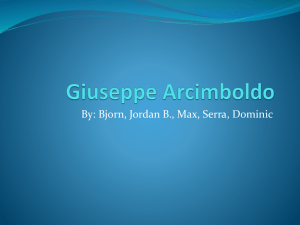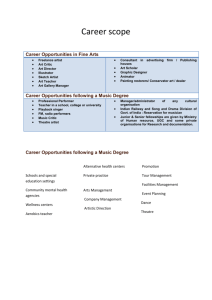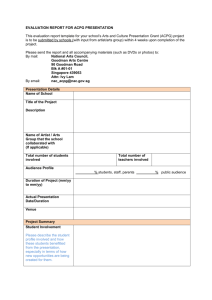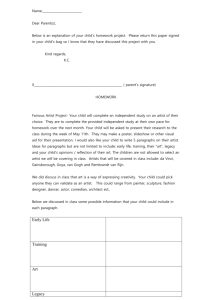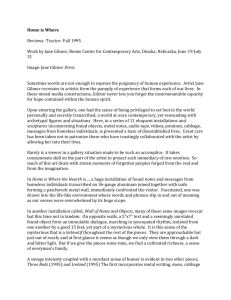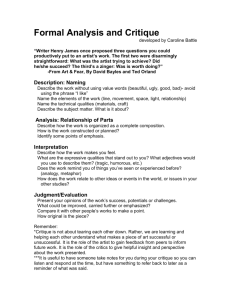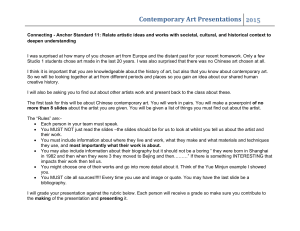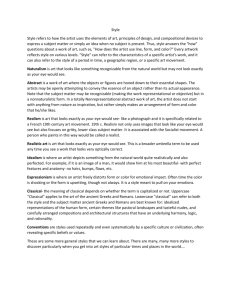ART.112.I50.FA.2014.Syllabus
advertisement
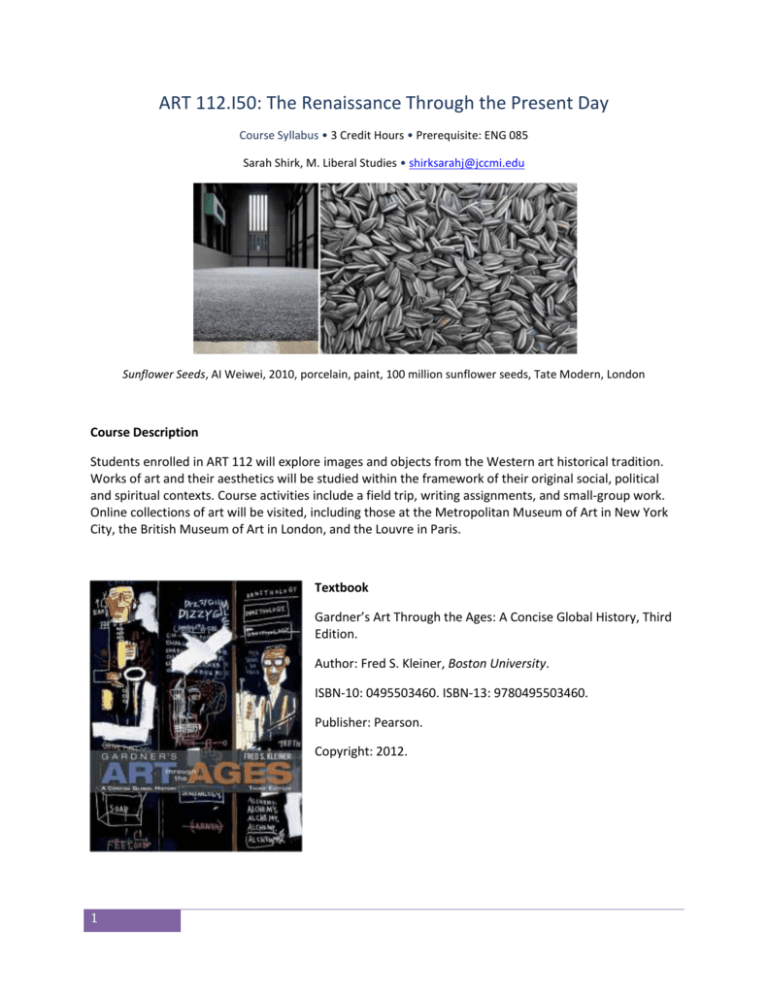
ART 112.I50: The Renaissance Through the Present Day Course Syllabus • 3 Credit Hours • Prerequisite: ENG 085 Sarah Shirk, M. Liberal Studies • shirksarahj@jccmi.edu Sunflower Seeds, AI Weiwei, 2010, porcelain, paint, 100 million sunflower seeds, Tate Modern, London Course Description Students enrolled in ART 112 will explore images and objects from the Western art historical tradition. Works of art and their aesthetics will be studied within the framework of their original social, political and spiritual contexts. Course activities include a field trip, writing assignments, and small-group work. Online collections of art will be visited, including those at the Metropolitan Museum of Art in New York City, the British Museum of Art in London, and the Louvre in Paris. Textbook Gardner’s Art Through the Ages: A Concise Global History, Third Edition. Author: Fred S. Kleiner, Boston University. ISBN-10: 0495503460. ISBN-13: 9780495503460. Publisher: Pearson. Copyright: 2012. 1 Course Objectives 1. Work in small groups in order to facilitate an atmosphere of respectful and productive discussion and collaboration. (Associate Degree Outcome 9) 2. Analyze art and architecture for their essential formal elements. 3. Understand aesthetic experience and artistic creativity. (Associate Degree Outcome 6) 4. Recognize the critical components of each artistic style. 5. Define and use art historical vocabulary terms. 6. Describe the historical, cultural and social aspects of arts. 7. Demonstrate interpretation and critical analysis skills in writing. Student Responsibilities 1.) 2.) 3.) 4.) 5.) 6.) Be mindful of the course calendar. Be aware of the required components of each assignment. Allow yourself to seek out assistance when you need it. Limit your online research to academically appropriate resources. Resist any urge to plagiarize. Manage your time well. Course Activities and Methods of Evaluation Discussion Boards (This activity meets the following Course Objectives: 1, 3, 5, & 7.) Activity: Each week, students will engage in discussion with their peers on an assigned topic. The instructor will provide two prompts, and students will answer each prompt for up to 5 points each, for a total of 10 points each week. The following rubric will be used to grade each post. Discussion Boards will close at midnight every Sunday. Both Prompts Addressed Writing is Clear and Logical Accurate Answers 2 3 1.5 0 Both prompts are answered in full. One prompt is not answered, or is not answered in full. Neither prompt is answered. 3 1.5 0 Writing is clear and logical. Writing is somewhat clear and logical. Writing is not clear or logical. 4 2 0 Both answers are completely accurate. One answer is completely accurate. Neither answer is completely accurate. Weekly Quizzes (This assessment meets the following Course Objectives: 2, 4, & 5.) Activity: The weekly quizzes will present students will 10 multiple-choice questions related to the chapter. Students can earn up to 10 points. Mid-Term Exam (This assessment meets the following Course Objectives: 2, 4, 5, 6, & 7.) Activity: Students will address one of three assigned short-answer essay prompts, and will compose a two-page essay in response. The essay must be formatted according to MLA standards, and include two academically appropriate online resources. The instructor will provide show students how to use MLA, and will also supply a list of academically appropriate online resources. Assessment: The essay will award up to 40 points. The essay will be graded in accordance with the following rubric. Mid-Term Exam Rubric Clarity and Format 10 Writing is clear, logical, is free of errors and meets format requirements. Use of Evidence Reading Proficiency Writing is somewhat clear, logical, is mostly free of errors and meets format requirements. 0 Lacks clarity and logic in structure, has errors and does not meet all format requirements. 10 5 0 Uses adequate information in answering two questions that are raised by the artist's work, and carefully cites all quotations and paraphrases. Uses some information in answering two questions raised by the artist's work, and cites some quotations and paraphrases. Inadequate use of information about questions raised by the artist's work, and/or fails to cite most quotations and paraphrases. 10 5 0 Demonstrates thoughtful and careful consideration of the available information on the artist's work. 3 5 Writing reflects moderate understanding of the available information on the artist's work. Writing does not reflect an understanding of the artist's work. Depth of Analysis 10 5 Writing and thinking go beyond restatement of facts and demonstrate depth through formal and conceptual analysis of three works of art. 0 Writing and thinking restate facts and demonstrate some depth through formal and conceptual analysis of three works of art. Writing and thinking simply restate facts and demonstrate no depth through formal and conceptual analysis of three (or less) works of art. Article Summary (This activity meets the following Course Objectives: 3, 6, & 7.) Activity: Students will write a 3-page article summary on Marcel Duchamp’s Art and the Geography of Modern Paris by James Housefield (2002). Students must read the article and take notes before engaging in a class discussion on the text. Summaries must be properly formatted according to the MLA style of writing and include a Works Cited page. Here is an excellent resource on how to properly use MLA: http://owl.english.purdue.edu/owl/resource/747/01/ Images may be included following the Works Cited page. Assessment: The Article Summary will be graded in accordance with the following rubric, and will award up to 40 points. (Note: rubric continued on page 6.) Article Summary Rubric Clarity Identification of Thesis and Evidence Format 4 10 5 0 Writing is clear and logical Writing is somewhat clear and/or logical Lacks clarity and/or logical structure 20 5 0 Uses adequate information from article in identifying the thesis and evidence used by the author Uses some information from article in identifying the thesis and evidence used by the author Inadequate use of information from article in identifying thesis and evidence 10 5 0 Writing is free of errors and meets all Writing is mostly free of errors and meets Writing has errors and does not meet all format requirements format requirements format requirements Final Essay This activity meets the following Course Objectives: 3, 5, 6, and 7. Activity: The final exam will assess will be composed of a reflective essays that students will compose after viewing one of two documentaries about contemporary artists. Students can choose to watch either a documentary on the contemporary Chinese artist Ai Weiwei called Ai Weiwei: Never Sorry, or a documentary contemporary street art and is titled Exit Through the Gift Shop . Students can access Ai Weiwei: Never Sorry by clicking on the following link: https://www.youtube.com/watch?v=QAADXK9MeOU. Students will compose a two-page reflective essay in which they argue whether Ai Weiwei is more artist or activist, or if his reputation rests on a careful balance of the two. Students can access Exit Through the Gift Shop by clicking on the following link: https://www.youtube.com/watch?v=K9rnyCyLFtE. (Please Note: this documentary contains content that may not be deemed not suitable for young audience. Please use your discretion before sharing with young family members.) If this film is chosen, students will compose a twopage reflective essay in class on the work of either the British artist Banksy, the French artist Mr. Brainwash, or the American artist Shephard Fairey. Students will argue either for or against the notion that the art is “good”, citing specific evidence from the movie, addressing two questions raised in the artist’s work, demonstrates thoughtful and careful consideration of the available information on the artist’s work, and writing and thinking in a way that goes beyond restatement of facts and demonstrate depth through formal and conceptual analysis of three works of art. Assessment: The essays will be graded in accordance with the following rubric, and will award up to 40 points each. Final Exam Rubric Clarity and Format 10 Writing is clear, logical, is free of errors and meets format requirements. Use of Evidence 10 Uses adequate information in answering two questions that are 5 5 Writing is somewhat clear, logical, is mostly free of errors and meets format requirements. 0 Lacks clarity and logic in structure, has errors and does not meet all format requirements. 5 0 Uses some information in answering two questions raised by the Inadequate use of information about questions raised by the artist's work, and/or raised by the artist's artist's work, and cites work, and carefully some quotations and cites all quotations and paraphrases. paraphrases. Reading Proficiency 10 Demonstrates thoughtful and careful consideration of the available information on the artist's work. Depth of Analysis 10 Writing and thinking go beyond restatement of facts and demonstrate depth through formal and conceptual analysis of three works of art. 5 Writing reflects moderate understanding of the available information on the artist's work. 5 Writing and thinking restate facts and demonstrate some depth through formal and conceptual analysis of three works of art. fails to cite most quotations and paraphrases. 0 Writing does not reflect an understanding of the artist's work. 0 Writing and thinking simply restate facts and demonstrate no depth through formal and conceptual analysis of three (or less) works of art. Plagiarism Policy If any student writing contains data, quotations, or paraphrases from other sources without adequate documentation in MLA, the assignment will be issued a grade of ‘zero’, with no further opportunity for resubmission. In addition, the student’s name will be reported to the Dean. Students who plagiarize may be failed from the course. Furthermore, if an assignment has been graded by the instructor and is then discovered to contain plagiarized content, the grade will be revoked and replaced with a zero, with no further opportunity for resubmission, and a report will be issued to the Dean. * The instructor is more than willing to help a student understand what constitutes plagiarism, and also how to avoid it through the proper use of MLA citation. If feelings of uncertainty regarding citation occur, students are encouraged to contact the instructor prior to beginning or submitting any writing assignment. Writing Skills As stated in the JCC Catalog, “(c)ollege courses often demand strong writing skills. To ensure your success you may receive assistance with your papers, essays, lab reports, documentation of sources and other written assignments. Find help to get you started with your writing assignments including brainstorming topics, organizing ideas, writing rough drafts, editing, proofreading, citing sources and more. Reference materials, encouragement and computers are available. Both faculty and peer tutors are available on a drop-in basis or by appointment” (22). http://www.jccmi.edu/Success/ 6 Academic Help The Center for Student Success is located in Burt Walker Hall Room 123. The Center’s phone number is 517.796.8415, and offers free tutoring, a drop-in learning lab, the Writing Center, assistance with study skills, time management, online class orientation, homework deciphering, and academic advising. Accommodations for Students with Disabilities Students with disabilities who believe that they may need accommodations in this class are encouraged to contact the Center for Student Success located in Burt Walker Room 123 or call 517.796.8415 as soon as possible to ensure that such accommodations are implemented in a timely fashion. Tutoring Free tutoring is available for this class as well as most courses at JCC. If you would like to work with a tutor please contact visit the Center for Student Success located in Burt Walker Room 123 or call 517.796.8415. Faculty and student tutors are available to help you succeed in your studies. Late Work Policy Late work is not accepted. Final Grade Breakdown 4.0 100-93% 2.0 74-70 3.5 92-85% 1.5 69-65 3.0 84-80 1.0 64-59 2.5 79-75 0.0 58-0 Calendar The JetNet course home page will function as our course calendar. 7
